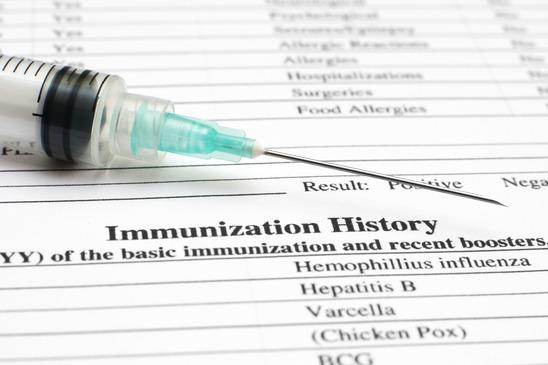Vaccines aren't just for kids

Most children are vaccinated to protect them from infectious diseases, but not all shots provide lifelong protection. Vaccines can help adults stay healthy, too.
Vaccines keep you, your loved ones and those in our communities healthy. Vaccines stimulate the body’s immune system to produce antibodies, your body’s natural defense against contagious diseases.
Most children receive a series of vaccines to protect them from infectious diseases like measles and polio well into their adult years. But there are many reasons why as an adult, you still need to be immunized.
The flu shot
Influenza, commonly known as the flu, is a highly-contagious infection of the nose, throat and lungs caused by the influenza virus. Most people can recover from the flu in a week or two, but it can be life-threatening for some at-risk individuals like people over 65 years of age, infants, and people with compromised immune systems.
The best way to protect yourself from the flu is by getting a flu shot. New strains appear yearly, so you will need to be vaccinated in the fall each year to be sure you’re adequately protected. Even if you don’t typically get the flu, you can protect those around you by getting vaccinated.
Shingles (Herpes Zoster)
The shingles infection surfaces as a painful skin rash with blisters. People with shingles experience muscle pain and fatigue. The symptoms can last for weeks, and the virus can cause deadly complications for those with weakened immunity. Shingles can also affect your eyes, which can lead to scarring and blindness.
Shingles is a variation of the same virus that causes chicken pox. If you’ve had chicken pox, the virus remains in your body even after you’ve recovered. If your immune system becomes weakened due to stress, illness or age, the virus can reactivate and manifest itself in the form of shingles.
Immunization can help to ward off shingles. You could still contract the illness even if you’ve had the vaccine, but it significantly reduces your chances. Check with your doctor to find out if the shingles vaccine makes sense for you.
Never been inoculated
If as a child, you were never vaccinated, or have an incomplete vaccination history, it’s a good idea to get your shots to make sure you and those you come in contact with are protected. You will need:
- Tetanus
- Diphtheria
- Pertussis (whopping cough)
- Measles
- Mumps
- Rubella (German measles)
- Varicella (chicken pox)
Boosters
Adults who were inoculated for tetanus, diphtheria and whooping cough as children require a booster shot to ensure continued protection. You should get a whooping cough booster once in adulthood, and the tetanus/diphtheria shot (available as a combo) every 10 years.
If you are over 65, your doctor may also advise that you also get a vaccine for pneumococcal disease, which can lead to pneumonia and other complications.
Travel shots
If you’re about to embark on a trip, you’ll want to be sure that your shots are up to date. In Canada, infectious diseases cause less than 5% of all deaths in our country. Unfortunately, in other parts of the world, infectious diseases still pose a significant threat.
If you’re not vaccinated, you could be vulnerable to diseases like polio, diphtheria, measles, and Hepatitis A and B (which can damage your liver). You can get Hepatitis A simply by having a cold drink with ice cubes that have the virus! And if you were to bring any of these infectious diseases home with you, they could spread quickly to other Canadians.
Depending on your destination, you may need additional vaccines for things like yellow fever or rabies.
Immunizations offer the most effective protection against these diseases, but don’t wait until just before you leave to get them as some are required weeks before departure.
Talk to your doctor or pharmacist or visit a travel clinic to be sure that you have the right shots to keep you fully protected from any diseases you may be exposed to.
If you fail to receive the right vaccines for your destination, it could void your travel insurance should you fall victim to a disease for which you should have been inoculated. Some countries such as Africa and South Africa won’t allow you into the country without proof of certain vaccines. Make sure you do your research before you go!
Keep vaccines on record
Remember to keep a record of all your vaccinations to ensure that you don’t miss critical vaccines that are intended to keep you safe and healthy. The ImmunizeCA app can you stay on top of your immunization history.
Even as you age, you need to be vaccinated to have the best protection possible for your health and the health of everyone around you.



